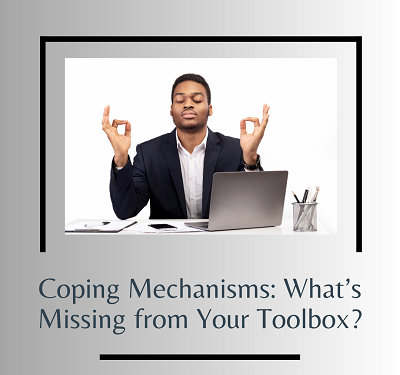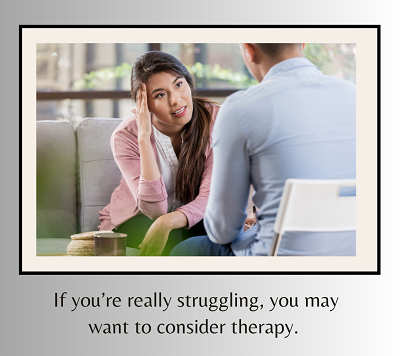Imagine you’re cooking, and the pan catches fire. You’d react, right? You’d either grab the flaming pan and rush outside with it. You’d smother it. You’d grab the fire extinguisher. You’d do something. Yet oftentimes, when our brain starts running away with us, many do nothing to stop it.
Most people keep basic tools at home. A hammer and nails always come in handy. That screwdriver tightened the loose screw on the cabinet. Yet when it comes to how we cope with things “coming loose” in our minds, many just suffer. Unsure how to remedy the situation.
This piece covers coping tools – a robust toolbox accessible to everyone. Call on these very important strategies when things in life get topsy-turvy and you need some extra care.
But first, it’s important to…
Diagnose the Warning Signs
Those who have been functioning a certain way their whole lives may not be aware of what leads to them overreacting, or getting so run down in the first place.
It’s crucial to pay attention to the really simple things. Things like when you last ate. How much sleep did you get? Are you worried about something? These very basic circumstances have the capacity to totally derail us if they’re consistently not attended to. They have a lot of influence over how we feel.
As a society, we’re pretty good at ignoring symptoms of burnout, stress, and overwhelm. By doing an audit of your life, taking into account your current circumstances and situation, may help open your eyes to potential triggers. Things that have the propensity to lead to discomfort. Becoming more aware helps you prepare so if something does happen, like you’re short on sleep, you’ll be more vigilant. Ready to deploy your tools should something jump out at you.
Catch Yourself in the Act
Almost as important is to catch yourself when you feel the pull. Is your heart rate increasing? Do you feel that familiar tingle in your hands as your breath becomes shallower and anxiety perks up?
Do those automatic negative thoughts about how you’re not good enough, worthy, pretty, whatever start going, and your face flushes and stomach clenches? This is a sign to head to your toolbox and find the appropriate tool.
Keep Your Tools on Hand – and Know How to Use Them
In order for your tools to be effective, they need to be used. Many people feel discouraged when they try something a few times, and it doesn’t seem to work. If you think about the months – even years – your brain has been slipping into destructive patterns, it’s become its default. Automatic. It’s going to take some effort to rewrite that script. Be patient and compassionate with yourself.
Here are some coping tools that help calm anxiety, depression, disappointment and rejection:
-
Come back to the breath – focusing on your breath helps clear space in your mind, and settle your central nervous system. Count to four as you slowly inhale. Some people picture a box, each count represents a side of the box as they draw it in their minds eye. Hold for four – you can visualize the sides of the box here too – and exhale for four.
Repeat as necessary.
-
Use the 3 3 3 Rule – scan the environment, and look for three objects, then identify three sounds, and finally move three parts of your body. Great when you’re feeling anxious.
-
Write it Down – thoughts that somersault around in the brain get very repetitive, and sometimes confusing. Take some time to jot down what’s bothering you. Is this something you can find a solution to? Perhaps you’re stressed about a recent medical diagnosis, or you’re worried about finances.
Write down what’s bothering you, be as specific as possible. If there is a solution – for example making a list of questions to ask your doctor, or looking at options to increase monthly income, write them down. If there’s no solution – it’s purely out of your control – make a list of things you can do to support yourself. Prioritize basics, like getting enough sleep, taking warm baths, spending time with friends, going outside and moving. Essentially, you want to make time for things you love that have a positive impact on you, both physically and mentally.
-
Go for a Walk – Getting out in nature is an excellent way to reset your mind. Observe your surroundings, notice how it differs throughout the seasons.
-
Go for a run or to the gym – It’s normal to not want to go to the gym. However, you’ll never regret it. Make a playlist of your most upbeat music, slip in your earbuds, and go for it. There are numerous benefits to exercise, both physically and mentally.
-
Compassionately Redirect – When you feel your brain want to go back to that thought, that worry, redirect it. Send it elsewhere. Remind yourself you are safe, and that ruminating over things won’t change the outcome.
Meditation helps. Find a guided one online, or sit still, focused on the breath. Follow it as it enters your nostrils, travels down to your lungs… belly… and then back out again. If your mind wanders (which it will!) just return to the breath.
-
Don’t Take it Personally – Easier said than done, right? A rejection or slight can bring us back. Leave us feeling small, insignificant, and make us somehow believe we’re not good enough.
Remember: external circumstances have no bearing on your inherent worth, or your overall talent. Nor do they have the capacity to define you.
-
Maintain Your Boundaries – People pleasers especially. Establishing and adhering to boundaries is vital, yet challenging if it’s not something you’re used to. It’s okay to say no. Don’t compromise your values for the sake of not having an uncomfortable conversation. Creating boundaries can feel uncomfortable at first, but the results are lasting, and have an exponentially positive impact that will last the rest of your life.
-
Rest – If you don’t rest, you’ll burnout. Take time for yourself. Enjoy a bath, a massage. Carve out extra time for sleep. Whatever you can do that gives you a moment to catch your breath, do it.
If you’re really struggling, you may want to consider therapy. Search ‘counseling near me’ to find a licensed credentialed expert in your area.
At the Relationship Therapy Center, we offer counseling in Fair Oaks and Counseling in Roseville, CA.
Curious to learn if you can benefit? Call, text, or visit our website. We’d love to hear from you and share how we can help.
Begin Therapy in Roseville, CA, Fair Oaks, CA, or Online in California:
If you are ready to change your life for the better, we can help. To begin therapy at our Sacramento area locations or online, follow these steps:
-
Contact the Relationship Therapy Center and schedule a free 20-minute phone consultation to learn more.
-
Meet with one of our talented therapists
-
Begin treatment and regain control in your life.
Services Offered at The Relationship Therapy Center in California:
Our Sacramento area counseling clinics located in Roseville and Fair Oaks, CA are pleased to offer a variety of mental health services. Our couples services include: Couples Counseling, Counseling after infidelity, sex therapy, co-parent counseling, family therapy, divorce counseling, intensive couples retreats, and premarital counseling. Our individual therapy services include anxiety treatment, therapy for children, teen therapy, depression treatment, codependency counseling and individual relationship counseling. Our therapists offer online counseling in California to treat a variety of mental health concerns. Please reach out to our Sacramento area therapy office to learn more about the many ways we can help you or your loved ones.



